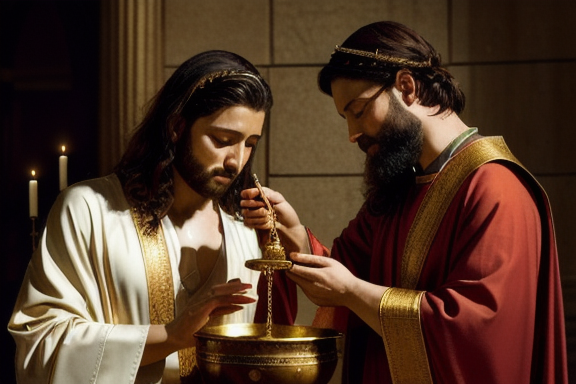Overview of the Story of David
The story of David is one of the most captivating and influential tales in the Bible. It encompasses his remarkable journey from humble beginnings to becoming the celebrated King of Israel. Understanding David’s ancestry, upbringing, and anointing as King provides valuable insights into his character and the divine plan at work.
David’s Ancestry and Lineage
David was born into the tribe of Judah, one of the twelve tribes of Israel. He was the youngest son of Jesse and grew up in Bethlehem, a small town in Judah. What makes David’s lineage particularly significant is his direct descent from Judah, the fourth son of Jacob and Leah. The Messianic promise of a future ruler coming from the tribe of Judah is fulfilled through David, as he becomes an ancestor of Jesus Christ.
One notable aspect of David’s ancestry is his great-grandmother, Ruth, a Moabite woman who chose to follow the God of Israel and became an ancestor of King David. This demonstrates God’s inclusive and redemptive plan, as He welcomes individuals from different backgrounds into His chosen line.
David’s Upbringing and Early Life
David’s upbringing as a shepherd played a significant role in shaping his character and preparing him for his future as King. As a shepherd, David developed qualities such as courage, vigilance, and compassion. These attributes would later serve him well when facing challenges as a leader.
One of the most well-known events from David’s early life is his encounter with Goliath, the Philistine giant. While the entire Israelite army trembled in fear, David fearlessly volunteered to face Goliath, relying on his faith in God. With a single stone from his sling, David struck down the formidable enemy, showcasing his unwavering trust in the Lord’s strength.
David’s Anointing as King
David’s anointing as King is a pivotal moment in his story. While Saul was still reigning as the first King of Israel, God instructed the prophet Samuel to anoint David as the future King. **This anointing symbolized God’s divine choice and favor upon David, despite his humble background.** From that moment on, the Spirit of the Lord came upon David, empowering him for the challenges he would face.
It is important to note that David’s anointing did not immediately result in him ascending to the throne. Instead, he spent years serving in Saul’s court, facing trials and threats to his life. These experiences refined his character and taught him valuable lessons in leadership, humility, and reliance on God.

David’s Victories and Achievements
David, the iconic biblical figure, was not only known for his faith and musical talents but also for his remarkable victories and achievements in various areas. From his defeat of the giant Goliath to his military successes and establishment of Jerusalem as the capital, David’s life was marked by significant triumphs.
Defeat of Goliath
One of the most well-known stories about David is his defeat of the Philistine warrior Goliath. Armed with only a sling and stones, David fearlessly faced Goliath, who was known for his size and strength. With a single well-aimed stone, David struck Goliath in the forehead, causing him to fall to the ground. This unexpected victory demonstrated David’s courage, faith, and reliance on God’s strength, making him an inspiring figure for generations to come.
Military Successes
David’s military prowess was another key aspect of his life. As a young warrior, he served in King Saul’s army and gained recognition for his bravery and strategic thinking. He led successful military campaigns against Israel’s enemies, including the Philistines, Ammonites, Moabites, and Edomites. David’s military achievements not only secured peace and stability for the nation of Israel but also established him as a respected and influential leader.
Establishment of Jerusalem as the Capital
One of David’s most significant achievements was the establishment of Jerusalem as the capital of Israel. After years of wandering, the Ark of the Covenant, a sacred symbol of God’s presence, found its resting place in Jerusalem during David’s reign. Recognizing the city’s importance, David conquered Jerusalem and made it the political and religious center of the nation. He also planned and prepared for the construction of the magnificent Temple, which would be built by his son Solomon.
David’s victories and achievements played a crucial role in shaping the history of Israel and the development of its identity as a nation. His triumph over Goliath showcased his unwavering faith and trust in God, inspiring others to face their own giants. His military successes brought stability and security to the land, allowing the nation to flourish. And his establishment of Jerusalem as the capital solidified its significance as a holy city.
David’s Flaws and Downfall
Despite his many victories and achievements, King David was not without his flaws. These flaws eventually led to his downfall and the tarnishing of his legacy. One of the most prominent examples of David’s flaws was his affair with Bathsheba.
David’s affair with Bathsheba, the wife of Uriah the Hittite, was a grave transgression. One day, while walking on the rooftop of his palace, David caught sight of Bathsheba bathing. He was captivated by her beauty and desire consumed him. David, already having multiple wives, should have resisted this temptation and respected the sanctity of marriage. However, he allowed his desires to overpower his sense of morality.
**To cover up his affair**, David attempted to bring Uriah back from the battlefield and convince him to sleep with his wife, so that it would appear that the child Bathsheba was carrying was Uriah’s. When Uriah refused to enjoy the comforts of home while his fellow soldiers were still fighting, David resorted to a sinister plan. He ordered Uriah to be placed in the front lines of battle, where he was certain to be killed. David’s actions were not only an abuse of power but also a violation of the commandments given by God.
David’s struggles with his own family also contributed to his downfall. **Despite being chosen by God as king**, David faced numerous challenges within his own household. His son Absalom, fueled by anger and resentment, rebelled against his father and sought to seize the throne. This rebellion resulted in a bitter conflict, and David was left heartbroken by the actions of his own flesh and blood.
David’s flaws and downfall serve as a reminder that even great leaders and heroes can succumb to their weaknesses. **His story teaches us about the consequences of giving in to temptation, abusing power, and neglecting the importance of family and morality**. It is a cautionary tale that reminds us of the need for humility, self-control, and obedience to the divine principles that guide our lives.
The Legacy of David
Despite David’s flaws and downfall, he remains an iconic figure in biblical history, leaving behind a lasting legacy that extends far beyond his lifetime. David is revered as a symbol of the ideal king, his impact on the development of Judaism is profound, and his influence on future generations cannot be overstated.
Symbol of the Ideal King
David’s rise from a humble shepherd to the King of Israel embodies the qualities of a righteous leader. He is often referred to as the “man after God’s own heart” due to his unwavering faith and devotion. David’s ability to unite the tribes of Israel, establish Jerusalem as the capital, and lead his people with wisdom and strength set a high standard for future kings.
**David’s reign is seen as a golden age in Israel’s history, characterized by prosperity, military victories, and the establishment of a strong kingdom.** His triumph over the giant Goliath, his musical talents as a skilled harpist, and his poetic Psalms further contribute to his image as an extraordinary individual.
Impact on the Development of Judaism
David’s reign marked a crucial period in the formation of Judaism. He played a pivotal role in the establishment of Jerusalem as the religious and political center of the Israelites. David’s desire to build a temple for God led to the construction of the First Temple, which became the focal point of Jewish worship.
**David’s contributions to the religious practices of his time laid the foundation for the development of the Israelite religion into Judaism** as we know it today. The Psalms he composed continue to be an integral part of Jewish liturgy, offering solace, praise, and guidance to worshipers.
Influence on Future Generations
David’s legacy extends beyond his own time, shaping the course of history for generations to come. The Davidic dynasty, established by his son Solomon, continued to rule over the Kingdom of Judah for centuries. The belief in the Messiah, a future descendant of David who will bring redemption and establish an eternal kingdom, became a central tenet of Jewish and Christian faiths.
**David’s story continues to inspire artists, writers, and musicians throughout the ages.** His triumphs and failures serve as a reminder of the complexities of human nature and the potential for both greatness and moral shortcomings.
In conclusion, David’s legacy as a symbol of the ideal king, his impact on the development of Judaism, and his influence on future generations cannot be overstated. Despite his flaws, David’s unwavering faith, leadership skills, and contributions to the religious and political landscape of ancient Israel have left an indelible mark on history.

Rockin’ the faith, one verse at a time!
Growing up, the Bible’s stories deeply impacted me. Now, with over 15 years of preaching experience, I blend timeless teachings with modern technology, making them relevant for today’s world.
Bible Hub Verse is my platform to share historical insights and thought-provoking articles, exploring both familiar and uncommon Christian topics. My passion is building a welcoming online space for everyone to learn, grow in their faith, and discover the Bible’s enduring message.
Join the journey!
God bless you.









